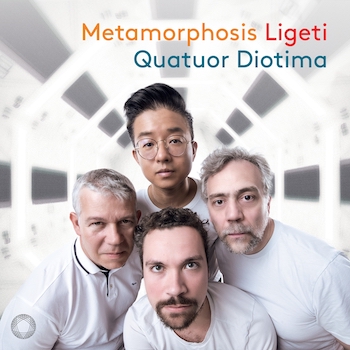Classic Music Album: Quatuor Diotima — György Ligeti’s “Metamorphosis”
By Jonathan Blumhofer
Quatour Diotima evince a thorough command of György Ligeti’s style, as well as a breathtaking grasp of the demands he makes on the instruments.
György Ligeti’s two string quartets rank among the most technically and expressively challenging of the last century. That’s saying something, especially given the company (Belá Bartók, Elliott Carter, and Leon Kirchner among them). It also helps explain why recordings of the set are relatively few and far between.
Enter Quatuor Diotima.  The French ensemble has a long history with these pieces but had refrained from recording them until now. The wait was worth it.
The French ensemble has a long history with these pieces but had refrained from recording them until now. The wait was worth it.
In the Quartet No. 1, which Ligeti completed in 1954 shortly after he’d fled Communist Hungary, the group mines the spirit of the music for all it’s worth. Throughout, their reading is driven but songful, from the ensemble’s almost-playful delivery of the opening theme (with its exaggerated glissandos) to their surprisingly lyrical delivery of its violent attacks.
The score’s whiplash shifts of character, from stomping, folk-like riffs to icy chorales and stuperous waltzes all come over with lusty spirit. That last aura pervades even the most frenetic, mechanical textures: surely this piece has rarely sounded like so much sheer fun – impish and wicked though some of that may be – before.
The Diotimas also bring a good deal of personality to their account of the Second Quartet. This 1968 effort is music of almost obsessive abstraction, yet the present performance manages a remarkable degree of individuality.
Its delicate spots – the second movement’s watercolor-like strokes and the finale’s misty, dreamy opening phrases among them – sing. Meantime, the explosive, mechanical episodes in the first and third movements are tremendously secure. So, too, the attacks in the gritty fourth movement, all of which are rock solid.
Between these two works comes Ligeti’s Andante and Allegretto for string quartet. It’s a curious effort, rooted in Hungarian folk music, all of it slightly off-kilter. Most notable is the finale, which comes out as something of a cross between Haydn, Renaissance music, and mid-20th-century central Europe.
In all of it, the Diotimas evince a thorough command of Ligeti’s style, as well as a breathtaking grasp of the demands he makes on the instruments. To be sure, nobody will ever make either of these quartets sound like child’s play. But the confidence with which the ensemble dispatches them is extraordinary.
Jonathan Blumhofer is a composer and violist who has been active in the greater Boston area since 2004. His music has received numerous awards and been performed by various ensembles, including the American Composers Orchestra, Kiev Philharmonic, Camerata Chicago, Xanthos Ensemble, and Juventas New Music Group. Since receiving his doctorate from Boston University in 2010, Jon has taught at Clark University, Worcester Polytechnic Institute, and online for the University of Phoenix, in addition to writing music criticism for the Worcester Telegram & Gazette.
